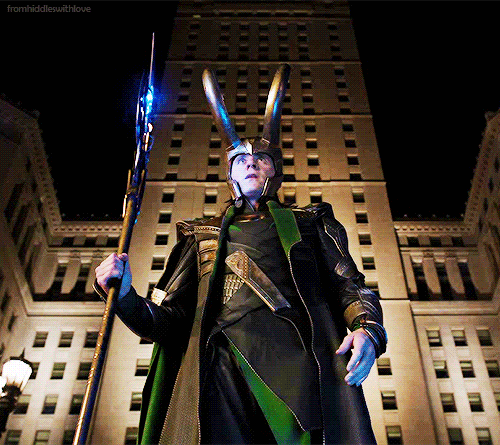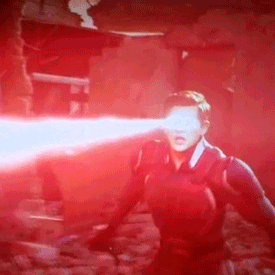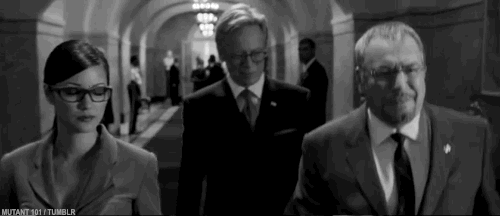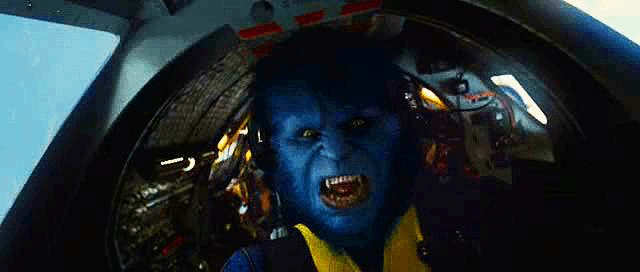American Gothic
Early on in CBS's new horror series a character makes a joke about his daughter's family looking like a Norman Rockwell painting. You see, the entire Hawthorne clan seems perfect but (WARNING!!! SPOILER ALERT!!! DO NOT READ ANY FARTHER IF YOU DON'T WANT SPOILERS FOR American Gothic!!!) they're not. This family has deep, dark secrets. Like one of them is a serial killer. The only question is "who done it?" Wait, that's my bad. There are two questions: "who done it?" and "why should anyone care?" I have a feeling only one of those questions will be answered by the end of the series and it won't be the latter. On the bright side, Virginia Madsen is fun to watch as the family matriarch.
 |
| It would be more exciting to watch this gif for an hour straight. |
Mad Men threat level: 3/10
BrainDead
In CBS's defense, they also recently debuted the more than respectable political comedy BrainDead, starring Mary Elizabeth Winstead and created by the duo behind The Good Wife. Winstead plays Laurel Healy, a struggling documentary filmmaker who enters the family business of politics to earn some cash. Her role in her brother's Democratic Senatorial staff points her towards an infestation of alien insects who are getting inside politicians brains and taking over. Along the way she embarks on a love/hate relationship with almost admirable Republican staffer Gareth Ritter (Broadway star Aaron Tveit, recently seen on screen in Grease: Live). Ritter's boss, Tony Shalhoub as Senator Red Wheatus, is a slacker but he's willing to reach across the aisle until the bugs get in his brain. That makes for a good cast and with smart writing and a quirky sense of humor BrainDead feels like it could be a cult classic, but it isn't quite exciting enough to be an instant one like Winstead's 2010 film Scott Pilgrim vs. the World. No, if this series becomes a cult classic it will have to earn the title by standing the test of time. Is it up to the challenge? We'll have to wait and see. That's how the test of time works.
 |
| Although, this is promising. |
Mad Men threat level: 6/10
Uncle Buck
I didn't have high expectations for the ABC series based on a John Hughes/John Candy classic but with the very funny Mike Epps as the star I though it might surprise me. Unfortunately, it did in all the wrong ways. Epps is charming enough but the writing is clunky and dull.
 |
| You're better off watching the original Uncle Buck but that's pretty much always true. |
Mad Men threat level: 3/10
Roadies
I absolutely love things that are about music. I love movies about music, TV shows about music and songs about music. That's why my all time favorite movie is Almost Famous, Cameron Crowe's loving tribute to the world of rock in the 1970's. That's also why I was so disappointed by Vinyl, the recent HBO series with more or less the same setting created by Martin Frigging Scorsese and Mick Goddam Jagger. Vinyl and Almost Famous both treat listening to music as a religious experience but in different ways. For Crowe music is radiating bliss consciousness but for Scorsese it's fire and brimstone. Enter Roadies on Showtime, Crowe's spiritual sequel to his magnum opus.
The first episode,written and directed by Crowe, opens with a quote from Tom Petty; "I think the general public has no idea what roadies do. Bless em' all. I just play the songs. They make the show happen." This show isn't about the hi-jinks of the drug addled rock stars who make the music you love, it's about the people behind the scenes with broken backs who make the music possible and love the band more than you'll ever know. And their hi-jinks.
Tom Petty's words fade into Luke Wilson's tour manager Bill giving an orgasm to a 22 year old before production manager Shelly, played by Carla Gugino, barges in. Bill and Shelly act like a married couple but as of now they're just a will-they-won't-they-they-will. It would feel forced if Gugino and Wilson didn't have such great chemistry. Actually, the entire cast is great apart or together, largely thanks to Crowe being a master of feel-good film making. Imogen Poots plays the show's young protagonist Kelly Ann in the midst of a quarter-life crisis considering a move from the road life to film school in New York. Poots exudes intelligent coolness even in her dorkiest moments. Even her skateboarding stunt double seems cool as hell. Everyone down to the number-crunching suit-wearing villain played by Rafe Spall is entirely endearing but the real scene stealer is Ron White's lovable loose-cannon Southern-rock cowboy Phil.
And of course, the music is great. Where Vinyl grabs you by the throat and shouts "remember this song?! Do ya, punk?!" Roadies uses music to create an ethereal journey. A journey full of Pearl Jam. All this leaves me with the question "do I love Roadies because it's good or because I love Almost Famous?" I know this: it's certainly not a bad show. I can't imagine anyone watching it without a smile on their face (unless I imagine watching that Luke Wilson scene with my parents, but let's just not do that). I can't be totally objective about it but the more I think about it the more I think Roadies is genuinely a very good show. Dare I say, it's all happening.
 |
| So cool. |
Mad Men threat level: the first ever 10/10










